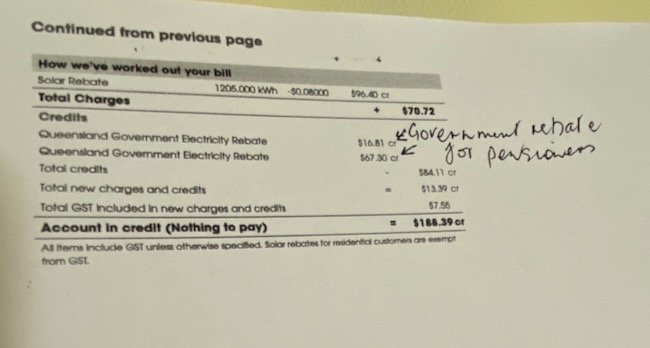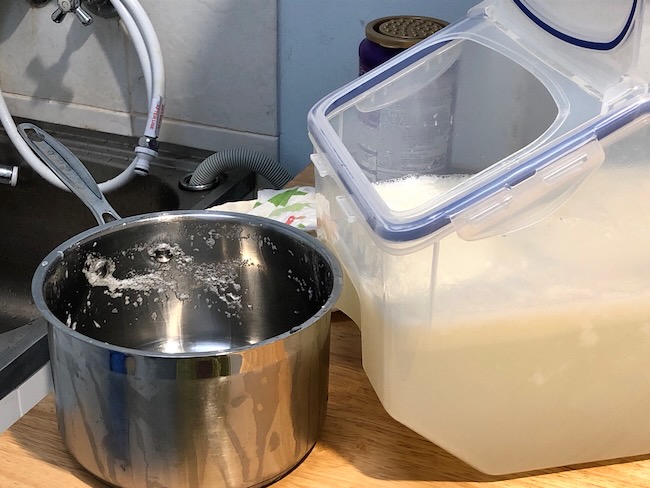I like to think I’ve got a pretty good grip on the work I do here in my home but now when I sit down to write to you, I can’t think of what I did this past week. Luckily I have photos I took along the way and after seeing them it all comes back to me. I’m still sorting through drawers and cupboards and getting rid of things I no longer have any reason to keep. It’s part of my general housekeeping now - a couple of times a week I bring in a little trolley, fill it with things I once thought I’d keep forever. Now my priority is to have a home that encourages me to be the person I am now, not the other Rhonda who was part of a couple. Every week life moves slowly away from the home of a happily married couple and towards a place when an independent woman lives. I hope I find the same level of satisfaction I had back then but it’s still early days and the practical work of rebuilding needs to be complete before I can make any judgements about contentment and happiness. Will the glass be half-full or half-empty?
.jpeg)
This is the area where I sit and think with Gracie at my feet. Sometimes I read here and sometimes I just listen to the radio and potter around. Gracie follows me everywhere now. If I go inside, so does she, if I wander outside, she follows. And if she’s sniffing around the yard and doesn’t see me go inside, she stands at the door and gives one loud bark and I know she wants me to open the door for her NOW.


Waiting for the postman. She doesn't bark at him, I think she just wants him to know she's there. 🙄

I’m building a flower, spice and herb garden on the sunny corner of the front verandah. It’s always nurtured ferns and tropical plants in the past, and I still have them, but I’m introducing flowers - roses, nasturtiums, foxgloves, yarrow, lavender, pansies and penstemon, as well as green onions, chilli, parsley and ginger.

This area changes almost every day. I used to be able to make instant decisions, now I have to look at my changes to decide if they suit me. 🤔 😵💫


That's a digiplexis foxglove in the pot. It's a soft orange colour with several flower spikes. I'll take a photo for you when the flowers are open.
.jpeg)
Plants waiting to be put somewhere. This area is a little further along the verandah.
Like most of you, I'm always trying to save the food I buy from being wasted. Now that I'm single this is more difficult. I bought a long cucumber last week, had one salad and knew the cucumber might sit in the fridge and waste away. So I grabbed the vinegar and pickling spices to make bread and butter cucumbers. The idea with this is to remove as much water as possible from the cucumber so I sprinkled a tablespoon of salt over thinly sliced cucumbers and left it a few hours. Then I washed the salted water away and squeezed the water off with a cucumbers in a clean tea towel. Don't forget to do this because if you add your pickling liquids and spices to the cucumbers in the jar, they'll release their water into the pickling liquid and will dilute the pickles.




They'll taste wonderful if you let the flavours develop but you can eat them straight away if you want to.
To make the pickling liquid, add the following to a small saucepan: 1 cup vinegar, ½ cup sugar, pickling spices, pepper and little pieces of onion or chilli if you have them on hand. Bring to the boil, simmer for 30 minutes and let it sit on the stove until slightly cooler. Taste it and if liquid is a bit strong for you, add ½ cup water. Then add the cucumbers and the still-hot pickling liquid to a sterilised jar and store it in the fridge. I have one serve of pickled cucumbers left but I'll buy another cucumber to pickle on my next shopping trip. I don't like oil in my salad dressing so I always make enough of this so I have some for salad dressing. I use the leftover liquid as salad dressing too. It keeps well in the fridge.
Parsley salt and dried parsley
Two other quick herby tips for you here - parsley salt and dried parsley. I harvested most of my parsley on Tuesday, washed it thoroughly and removed the stalks (they're bitter when dried). Preheat your oven for the dried parsley now - 180C/350F and when it reaches temp, turn it down to 120C/250F. Make the parsley salt while your oven is heating up.
This is what the sink full of parsley looks like now.
Parsley salt
To a food processor, add 1 cup salt, I used pink Himalayan salt but rock salt or pure cooking salt is also good.
Add two cups of parsley with no stalks.
Process the mix until the parsley is flecked through the salt but don't overprocess because the salt will be too fine. Lay it out on a plate to dry for about an hour then add it to a jar. Store in the fridge and give it a gentle shake every couple of days so it doesn't clump together.
It's great to use in scrambled eggs, sprinkled over the top layer of lasagne or any pasta, mashed potatoes, salads, roast meats, steak and, of course, fish. You can do this with a variety of herbs - oregano, sage, bay leaves, coriander/cilantro, fennel, rosemary or finely grate lemon or orange zest and add it to the salt. All of them store well in the fridge.
Dried parsley
Then go on to your dried parsley. Dry the leaves as much as possible, preheat eat your oven to 180C/350F and when it reaches temp, turn it down to 120C/250F.
Lay the washed, dried parsley, with stalks removed, onto baking paper in a baking tray, place the tray in the oven making sure you have your temps right. Leave it in the oven for about 25 minutes then remove from the oven. When it cools down, crush the parsley with your hands and add it to a jar. Two well loaded large oven trays gave me the amount you see in the small jar. Store this alongside your herbs and spices in a cupboard.
🌿 💚 🌿
The creation of my new life is a slow process. I could sit back and let it make its own way but I want my life to include diversity and creativity as the the main building blocks; and I want moments of joy liberally mixed throughout each ordinary day. I'm so thankful that Hanno and I prepared well for this part of life because if I had to go from what we had five years ago to what I'm capable of now and in the future, I'd be in a worse space. I guess I've done the difficult part of working out what I want in my life now. It's important to me to continue with the housework I've done in the past. I will still cook from scratch - for Gracie and me, preserve, bake occasionally, keep a small stockpile, make my own cleaners and laundry liquid. I will continue to look for opportunities to be kind and generous. Those ordinary everyday tasks help define my life giving each day structure and purpose and a reason to get up every morning. Of course, family is a significant part of my life and while my family has changed, it's still on top of the priority list.
What fits into the rest of my life is what I'm focusing on now. It will be made up of creativity, productivity, sharing what I know and being grateful for each new day. It's a complex model of a simple life but I guess every life is complex in its own way. I'm glad I have the freedom to create life in the way I want it to be and I have the time now try different things to fit into the mix I already have.
Kerry and Jamie bought Gracie a dogie donut (with bacon topping) and a bone biscuit. She wasn't sure what to make of it first but she didn't hesitate in eating both of them.
My main new thing will be painting and drawing. I used to be quite artistic when I was young and I want to examine that again. I also want to do some final getting published/writing workshops. Of all the workshops I've done, I enjoyed the writing ones the most. I need to earn some money to build up my nest egg again after I spent so much during Hanno's final months. I want to have some workshops here, maybe with lunch included, and maybe some on Zoom. If you're interested in this, let me know because it will help me make the decision on whether to go ahead or not.
But that's all in the future and today is just as important. When I finish here, I'll tidy the kitchen, harvest chard, set some aside for lunch and freeze the rest. My bed is made but I have to put away yesterday's washed clothes and sheets. Two toilets must be cleaned and I'll finish off reorganising the laundry. After lunch Gracie and I will be out in the garden fertilising, cleaning up, weeding and repotting. We're expecting rain this afternoon so I want both verandahs clean and tidy before the wind and rain starts.
And that's it for me, another ordinary day done and dusted. I hope things are going well for you. Home life is usually busy when seasons change. What are you doing? I send my love across the miles. xx


.jpeg)


.jpeg)






.jpeg)










.jpeg)





.jpeg)












.jpeg)





.jpeg)
.jpeg)
.jpeg)
